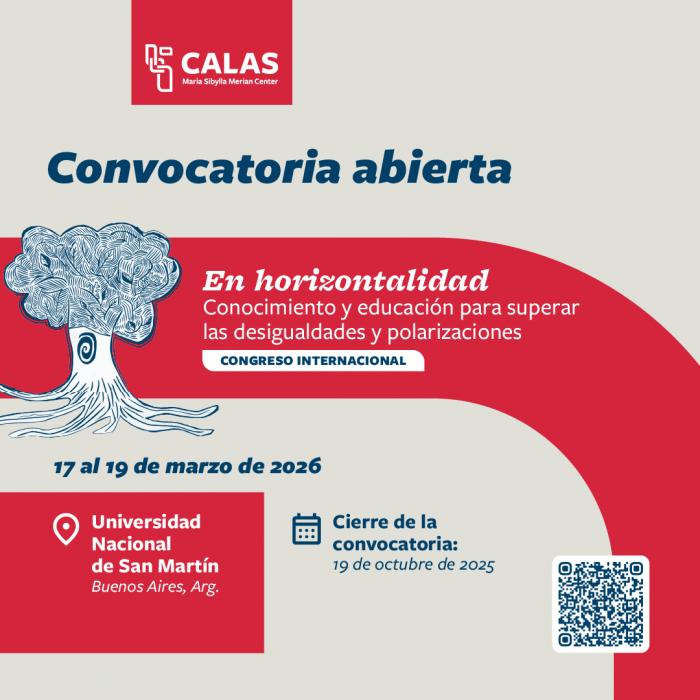The Center for Advanced Latin American Studies (CALAS) is opening the call for applications to participate in the international conference “Horizontality: Knowledge and Education to Overcome Inequalities and Polarization,” to be held at the National University of San Martín, Buenos Aires, from March 17 to 19, 2026.
Objective of the Conference
Throughout history, education has been a central topic of debate and dispute, especially when it comes to responding to the challenges that societies face in different eras. Today, we are dealing with problems that, although seemingly unprecedented, are rooted in the ruins of the past. Although education is currently seen as a key factor in addressing social, political, and economic problems, it also has the potential to open new horizons. At the same time, the political management of education faces challenges. Today, education is presented as a key factor in addressing social, political, and economic problems, as well as having the potential to open new horizons. At the same time, the political management of education faces significant challenges due to the unequal distribution of knowledge, which reproduces power relations and hierarchies. The rapid evolution of technologies such as Artificial Intelligence (AI) is causing growing uncertainty about their socio-political consequences, while technological production often perpetuates inequalities and poverty.
In the case of Latin America, factors such as school dropout rates, the disconnect between educational models and social realities, the neglect of vernacular languages, and cuts in education budgets threaten to further fragment systems. In many ways, the models for education and knowledge production are exhausted. It is now necessary to turn to dialogical, horizontal models that recognize the diversity of interests and knowledge and propose thinking about education with all those involved in the processes in order to overcome our regional and global crises. At the same time, it is worth asking what impact the region's genuine proposals to implement critical pedagogy have really had and what new ideas for overcoming inequalities and polarization are emerging from Latin America and the Caribbean.
Faced with the task and challenge of questioning education and the forms of knowledge production, the Knowledge Laboratory "In Horizontality. Knowledge and education to overcome inequalities and polarisation" aims to critically reflect on the problems, challenges and needs for transformation in 21st-century education. It focuses on four main areas: a) Horizontality and educational inclusion b) Experiences and knowledge in education c) Challenges facing society: artificial intelligence and knowledge d) Global knowledge in education.
Areas of interest
1. Horizontality and educational inclusion
The question of educational inclusion challenges a present marked by deepening inequalities and the rise of polarizing, anti-democratic discourses that perpetuate racist, class, and gender exclusion. Within this framework, this axis addresses debates about the right to education, access, retention, and completion of students at different levels of the educational system, as well as studies and research on the relationship between education, social rights, and/or access to meaningful and relevant learning/knowledge for all.
2. Experiences and knowledge of education
Understanding what education means nowadays requires mapping the multiple educational experiences and the knowledge they involve, articulating local, regional, and global perspectives to recognize their diversity and complexity. In this sense, the second axis seeks to reflect on the alliances and tensions between local, regional, and international educational offerings and policies, curricular debates in relation to non-hegemonic knowledge, educational practices in non-school contexts, educational cartographies, educational proposals, and struggles of meaning over the multiplicity of purposes and meanings attributed to education in diverse communities.
3. Societal challenges: artificial intelligence and knowledge
The emergence of AI on the scene and in public debate, and its impact, primarily since the emergence of generative AI (GIA), has raised a series of questions that have specific implications for the field of education. The third axis invites projects that address questions associated with teaching and learning processes, forms of knowledge production, circulation, and validation, the role of teachers, and the place of educational institutions in a society increasingly marked by the hybridization between the human and the mechanical. It is imperative to recognize the most human aspects of human beings in the face of AI or technological authoritarianism and, from there, to strengthen that condition so that the task of education means learning to investigate with others in a horizontal manner.
4. Knowledge of the interconnected world in education
In the face of the questions raised by the crises of our time, it is essential to understand how knowledge is selected, transmitted, and constructed in formal and non-formal education systems. In this regard, the fourth theme seeks to discuss the knowledge of the world that is the subject of teaching and learning at various levels of the education system. We invite research that brings into play both a particular and a comparative perspective on knowledge and its transmission in contemporary education, especially in relation to issues such as civic education and the values of democratic coexistence.
Rules for the call for applications and application process:
➢ The call for applications is aimed at candidates from the social sciences and humanities who can contribute solid theoretical and/or empirical reflections on at least one of the areas mentioned in the call.
Application:
➢ Complete the online application form with the proposal's title and summary (400-500 words) and a brief academic profile indicating your professional background and relevant publications. If accepted, you must commit to sending the document with the description of the proposal made for the presentation.
➢ Language: Spanish or, optionally, English.
➢ Deadline for submitting proposals: October 19, 2025.
➢ An academic committee will select the papers based on criteria of excellence. Applicants will be notified by November 20, 2025, of the decision regarding their papers.
➢ CALAS will cover the participants' accommodation and meals. In addition, there will be limited resources to cover travel expenses if required. >Due to the number of applications, rejections will not be justified.
Further information:
Maria Sibylla Merian Center for Advanced Latin American Studies,
tel. +52 33 3819 3000 (ext. 23594) –
Email: merian.calas@gmail.com
Web: http://www.calas.lat


